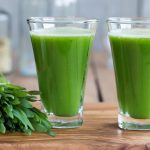Chlorophyll prevents infections and blood disorders
 (NaturalHealth365) Are you consuming nature’s perfect superfood? Found in barley grass, wheat grass, alfalfa, leafy greens, algae and blue-green algae, chlorophyll was found – in a study by Oregon State researchers – to offer protection against cancer, infections and blood disorders, especially from aflatoxin – a fungus associated with causing liver cancer and hepatitis.
(NaturalHealth365) Are you consuming nature’s perfect superfood? Found in barley grass, wheat grass, alfalfa, leafy greens, algae and blue-green algae, chlorophyll was found – in a study by Oregon State researchers – to offer protection against cancer, infections and blood disorders, especially from aflatoxin – a fungus associated with causing liver cancer and hepatitis.
“We showed that aflatoxin is absorbed quite rapidly and that chlorophyll and chlorophyllin have an ameliorating effect, preventing the toxin from getting into the bloodstream,” – John Mata, second author of the study.
Chlorophyll helps to crush cancer cells
Chlorophyll is nature’s sunshine-producing superfood. The phytochemical responsible for giving plants their vibrant green hue, chlorophyll helps oxygenate and detoxify blood, assist in building strong bones, improve digestion, elicits anti-carcinogenic activity and helps improve blood pressure.
Aflatoxin – found in food sources such as corn, soybeans and peanuts – can be fatal when overconsumed. This fungus has been associated with causing liver cancer and playing a part in the development of hepatitis. When exposed to chlorophyll in live human subjects – aflatoxin was destroyed!
Researchers at Oregon State University were excited to publish their findings in the journal Cancer Preventive Findings. This was a particularly noteworthy study to support the efficacy of chlorophyll given its “phase 0” approach.
Phase 0 refers to human volunteers subjecting themselves to conditions where small doses of therapeutic agents are used to draw measurable results. Because this type of study directly tests human subjects, the method increases study integrity.
Chlorophyll is a dynamic digestive aid
It’s no secret that an unbalanced diet can lead to poor digestive motility. Refined foods, those low in fiber and high in fat are difficult to metabolize often leaving us feeling fatigued and bloated.
In small amounts taken daily, chlorophyll can help break down these stubborn foods to mobilize their waste products more easily from the colon and may mildly reduce constipation. Once properly metabolized, chlorophyll can help “liberate” helpful nutrients from foods such as fats for absorption.
Are you reducing your exposure to heavy metals?
Chlorophyll behaves like a sponge, absorbing environmental toxins from the body such as PCBs, dioxin, mercury and other heavy metals. Chlorophyll helps eliminate these toxins from the body as well.
Words of caution: Avoid buying pond scum.
Before choosing a supplement, be sure to verify the source’s quality. Plants that are commercially prepared often contain pesticides and other harmful soil, water and environmental contaminants. Be sure your chlorophyll meets these guidelines:
- Grown in sunlight
- Grown in human-made conditions outdoors, not “naturally occurring” ponds or bodies of water
- Pools of water should be sheltered from potential outside environmental toxins such as rainfall and other pollution
If you derive your chlorophyll supplementation from chlorella a form of algae, be sure to select broken cell wall and USDA organic.
About the author: Christine M. Dionese L.Ac, MSTOM is an integrative health expert, medical journalist and food writer. She’s dedicated her career to helping others understand the science of happiness and its powerful effects on everyday human health. Christine practices, writes and speaks on environmental functional medicine, epigenetics, food therapy and sustainable living.
Sources of this article include:



